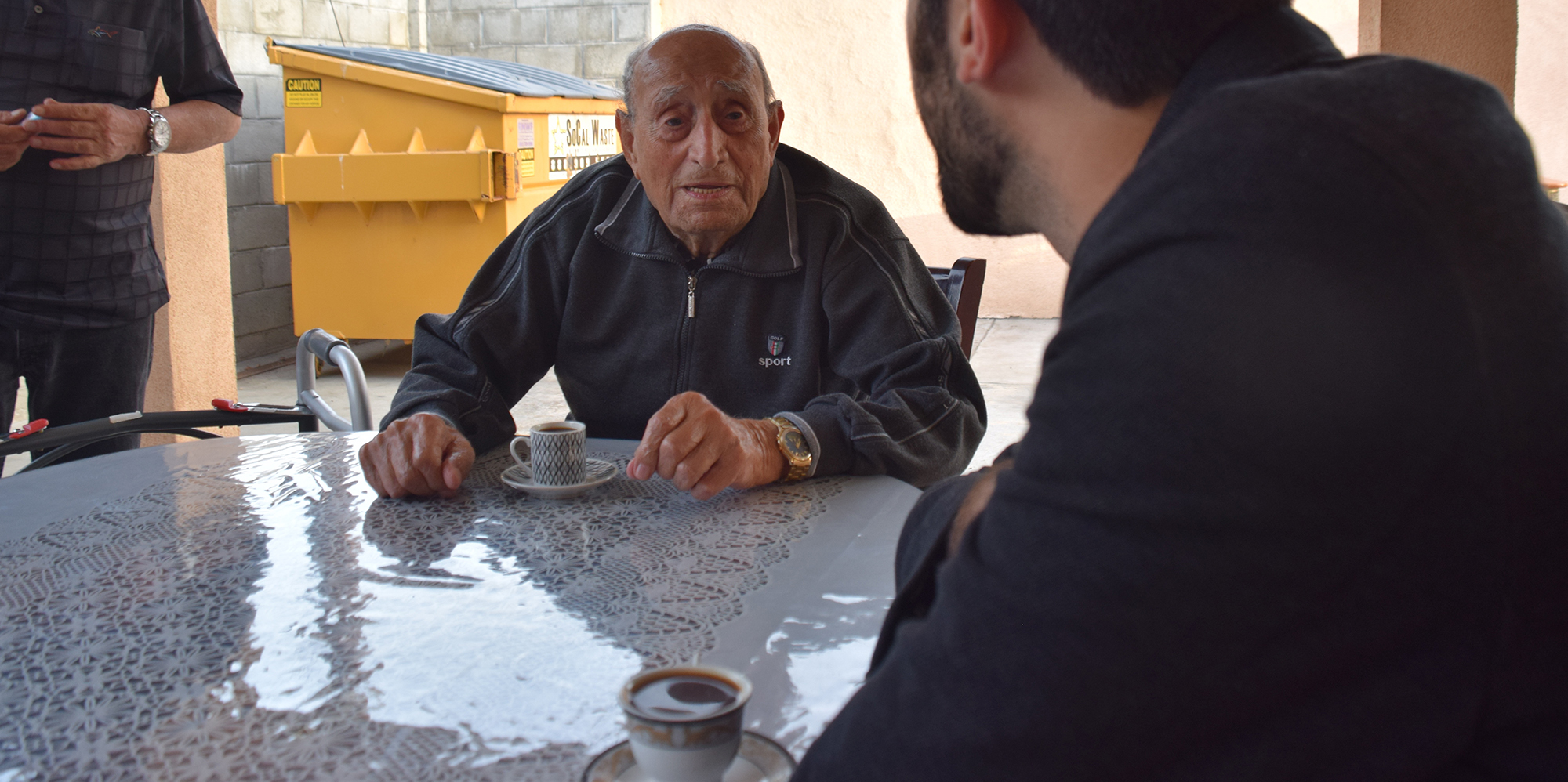Aleksan Markaryan: The Last Interviewee

USC Shoah Foundation mourns the death of Armenian Genocide survivor Aleksan Markaryan in January 2017. The story below was written in April 2016 when USC Shoah Foundation staff visited him at his home in Los Angeles.
At 110 years old (according to him; no one knows for sure), Aleksan Markaryan is the life of the party. Within minutes of meeting visitors for the first time, he’s launched into a story about his long, fascinating life.
“He remembers too many things,” says his friend Ana. “Whenever people come over, we say, ‘Look at this man, he’s 109 years old. Ask him a question. He says, ‘I remember everything.’”
Markaryan’s crystal-clear memory of the genocide against the Armenian people in 1915 has given him the distinction of being the last survivor interviewed by the Armenian Film Foundation for its collection of Armenian Genocide survivor and witness testimonies.
One hundred fifty-five more testimonies from the AFF collection were integrated into the Visual History Archive this month, for a total of 245 since the collection launched in April 2015. The final batch of 86 testimonies will be integrated by fall 2016.
Markaryan was born in Kayseri (Gesaria), Turkey, possibly around 1913 (which would actually make him about 103). His father went to military service as a laborer in 1914. His family, along with a few other individuals, was deported to another village due to his father's military conscription. Their family was taken in by a hoca (Islamic clergy) of a village and given a home. After a year, threats on their life restarted because they were Armenian and the village hoca told them to temporarily convert to Islam to save their lives. They did and were treated quite normally by other Turkish villagers afterwards.
When World War I ended, they decided to move back to Kayseri and reconverted to Christianity, along with most Armenians in the area. They made sujuk (sausage) and bastirma (pastrami) like all the other Armenians for a living and carpets too.
Markaryan’s sister moved to Beirut, Lebanon, and in the early 1920s they left Kayseri for Beirut to join her. His father had already died much earlier. Markaryan became a master of multiple crafts and established himself there.
After the 1946 call for repatriation to Armenia by the Soviets, Markaryan moved his whole family there. Due to his artisanal skills, he was placed in Yerevan and did well for himself. In 1988, he moved to the United States. Today, he has two children and lives in Los Angeles near his son, Agop Margarian. He has four grandchilren and seven great-grandchildren.
Tonight Markaryan and Margarian have agreed to visit with Carla Garapedian, member of the Board of Directors of the Armenian Film Foundation, Aleksan Giragosian, who conducted the AFF interview with Markaryan last year, and Manuk Avedikyan of USC Shoah Foundation, who has just watched and indexed Markaryan’s interview in preparation for its integration into USC Shoah Foundation’s Visual History Archive.
Over tiny cups of Armenian coffee, Markaryan hardly needs any prompting before the stories start pouring out of him. In Armenian – he doesn’t speak a word of English – he talks about where he was born, the time his parents dressed him like a girl to protect him as he traveled between villages, the ice cream shop where he worked as a youth.
In between stories, Giragosian and Avedikyan try to get him to reflect on his life. How does he feel about Turkey, over 100 years after the genocide, they ask?
“The government turned them against us, but the people are okay,” Markaryan says, through their translation.
Markaryan is a friend of Giragosian’s family, and Giragosian used to visit with him at his aunt’s house years ago. After meeting Garapedian at an event for the Armenian Law Students Association, he suggested AFF record Markaryan’s testimony. He and Garapedian conducted the interview in June 2015.
When Giragosian first met him, Markaryan would garden, even plant trees. Now, as Markaryan’s health has begun to decline, Giragosian hasn’t seen him around much.
“Seeing him again is a nice opportunity to reconnect,” Giragosian says. “It’s like seeing an uncle.”
As the light begins to fade and everyone finishes their coffee, Avedikyan asks Markaryan one final question – why did he give his testimony?
Markaryan answers quickly, matter-of-factly. Avedikyan reports, “He wants the world to know his story.”
Like this article? Get our e-newsletter.
Be the first to learn about new articles and personal stories like the one you've just read.